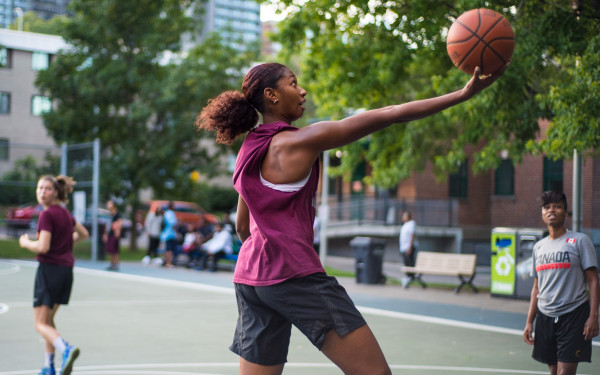Stingers against racism
How Concordia’s student-athletes are fighting injustice
On a Wednesday night in early September, amid the chaos of a return to class during a pandemic, Stingers staff and players held a Zoom meeting like no other seen that week.
Student-athletes and Concordia athletics staff convene once a week to discuss social issues such as systemic racism and police brutality, topics that have been at the forefront of public discourse since the deaths of Black Americans at the hands of law enforcement officers earlier this year.
“This is the culmination of years, decades, and centuries of blood, sweat, and tears that our athletes are supporting,” director of athletics D’Arcy Ryan said.
Women’s basketball head coach Tenicha Gittens approached associate director of student-athlete services Graeme McGravie with the idea to hold meetings including staff and athletes. Every varsity team was represented by their respective head coaches and at least one athlete.
“We could easily have had the whole student-athlete population involved, but to give it a start, we decided to limit it to a maximum of two athletes per team,” McGravie said. “It was up to the coaches to get volunteers from their teams, and they had no trouble finding student-athletes who were eager to get involved.”
This initiative is meant to empower Stingers student-athletes and give them a platform to speak out on injustices that they have either experienced or seen around them. It is the athletes who have been tasked to champion these discussions and come up with ideas for sustainable change.
“It’s really important for us to give these athletes a space where they can express themselves because this is really about them,” Gittens said. “They are the most affected, so we want them to know that they can drive change and speak their truth.”
“This is the culmination of years, decades, and centuries of blood, sweat, and tears that our athletes are supporting.” – D’Arcy Ryan
So far, the committee has established their objectives and the ways they best see them being reached.
“We’ve come up with three pillars we want to focus on: education, community engagement and fundraising,” said men’s hockey forward Chase Harwell.
Harwell is well aware of how important it is for him and his peers to get involved in the community.
“We have Ed Meagher arena on campus, right by where I live, but if you go down a couple blocks, you run into neighborhoods where they don’t have any facilities for kids to take advantage of,” he said. “I think hockey ,and sport in general, is so important to giving marginalized communities hope and gives these kids a chance to follow their dreams.”
The Réseau du sport étudiant du Québec, the conference under which most Stingers teams compete, has yet to voice its support for the momentum being created to combat systemic racism. While it has been busy trying to create an environment for a safe return to play, its silence is being noticed.
“A couple of our players and staff have expressed disappointment in our conference for not really speaking out or denouncing some of the injustices we’ve seen south of the border,” Gittens said. “We also expect them to be active in addressing issues that have occurred or may occur in the future, since this stuff happens locally as well.”
One other concern raised by some in the Stingers organization is the lack of coordination within Concordia when it comes to addressing these issues.
“We want to be the agents of change for this institution, but for it to truly work, the message has to trickle through the university as whole,” McGravie said. “Unfortunately, academic institutions are generally slow to accept and effect a lot of change rapidly.”
And while the university copes with the transition to virtual classrooms, those Stingers leading these discussions will make sure their efforts are kept at the forefront of the institution’s agenda.
“We’ve been adamant about keeping up the dialogue and work, and keeping the pressure on,” Gittens said. “That’s why it’s important for us, as the adults here, to keep our student-athletes on track, and not forget about the momentum they’ve created by getting too distracted.”
With the announcement that the RSEQ has cancelled all university sports this fall, the Stingers see this year as an opportunity to strive for lasting change to the injustices that have plagued society for decades. The question now is how to implement this change as student-athletes.
“When we’re all long gone, we want to have something we can look back on and know we made a difference.”

_900_598_90.jpg)



_600_375_90_s_c1.jpg)
_600_375_90_s_c1.jpg)
1_600_375_90_s_c1.jpg)